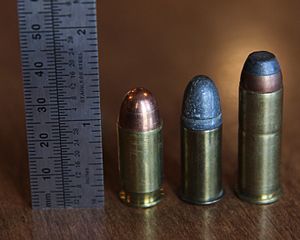.44 S&W American
| .44 S&W American | ||||||||||||||||||||
|---|---|---|---|---|---|---|---|---|---|---|---|---|---|---|---|---|---|---|---|---|
 .44 S&W American (center) with .45 ACP (left) and .44 Magnum (Right) | ||||||||||||||||||||
| Type | Revolver | |||||||||||||||||||
| Place of origin | USA | |||||||||||||||||||
| Production history | ||||||||||||||||||||
| Produced | 1869-1940 | |||||||||||||||||||
| Specifications | ||||||||||||||||||||
| Bullet diameter | .434 in (11.0 mm) | |||||||||||||||||||
| Neck diameter | .438 in (11.1 mm) | |||||||||||||||||||
| Base diameter | .440 in (11.2 mm) | |||||||||||||||||||
| Rim diameter | .506 in (12.9 mm) | |||||||||||||||||||
| Case length | 0.91 in (23 mm) | |||||||||||||||||||
| Overall length | 1.44 in (37 mm) | |||||||||||||||||||
| Rifling twist | 1:20 | |||||||||||||||||||
| Primer type | Large pistol | |||||||||||||||||||
| Maximum pressure | 8,000 CUP | |||||||||||||||||||
| Ballistic performance | ||||||||||||||||||||
| ||||||||||||||||||||
| Source(s): Barnes & Amber 1972 | ||||||||||||||||||||
The .44 S&W American (commonly called the .44 American) is an American centerfire revolver cartridge.
Description[]
Used in the Smith & Wesson Model 3, it was introduced around 1869.[1] Between 1871 and 1873, the .44 Model 3 was used as the standard United States Army sidearm.[1] It was also offered in the Merwin Hulbert & Co. Army revolvers.[1]
It used an outside lubricated heeled bullet and appeared in either Boxer and Berdan priming,[1] and both black and smokeless powder loadings.[1] The heeled bullets make the cartridge incompatible with .44 Russian, .44 Special, and .44 Magnum, which was made larger in diameter and longer to cover the exposed part of the bullet.
Its power resembles the .41 Long Colt,[1] .32-20 Winchester,[2] or .44-40 Winchester,[3] and it could be used to hunt small game at short range.[2]
The .44 American ceased to be commercially available around 1940. It can be handloaded by shortening and reforming .41 Magnum cases.[1] Original black-powder revolvers should only use black-powder loads; modern powders will generate excessive pressures.[1]
During the gunfight at the O.K. Corral on October 26, 1881, Wyatt Earp carried an 8-inch .44-caliber 1869 American model Smith & Wesson. Earp had received the weapon as a gift from Tombstone, Arizona mayor and Tombstone Epitaph newspaper editor John Clum.[4]
See also[]
References[]
Sources[]
- Barnes, Frank C., ed. by John T. Amber. ".44 S&W American", in Cartridges of the World, pp. 167 & 177. Northfield, IL: DBI Books, 1972. ISBN 0-695-80326-3.
- Barnes, Frank C., ed. by John T. Amber. ".32-20 Winchester" in Cartridges of the World, p. 46. Northfield, IL: DBI Books, 1972. ISBN 0-695-80326-3.
- Barnes, Frank C., ed. by John T. Amber. ".44-40 Winchester" in Cartridges of the World, p. 61. Northfield, IL: DBI Books, 1972. ISBN 0-695-80326-3.
- Pistol and rifle cartridges
- Smith & Wesson cartridges